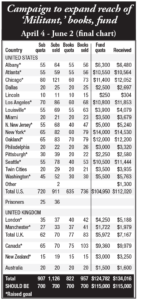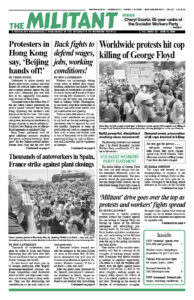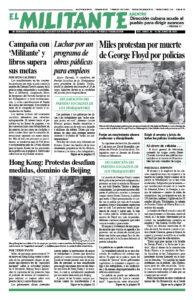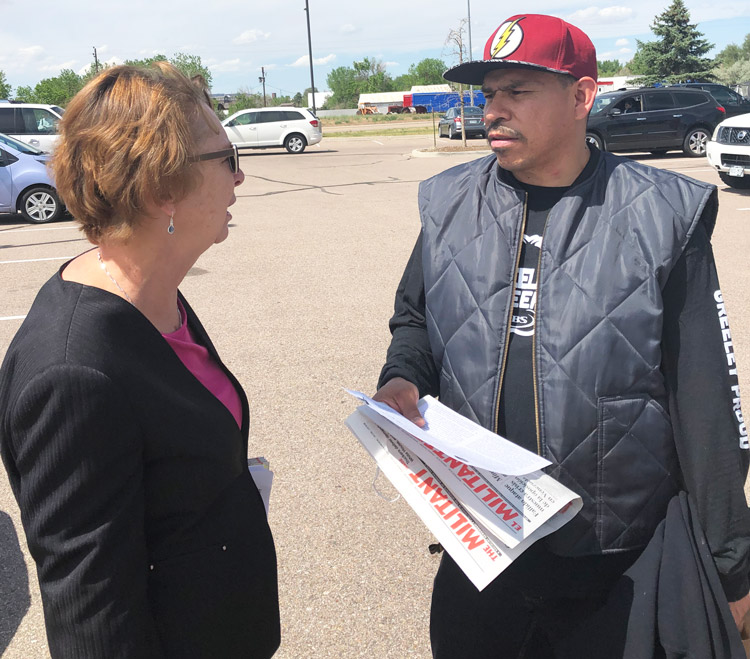Participants in rapidly growing protests around the country against the cop killing of George Floyd are buying up copies of the Militant newspaper and subscribing, purchasing books by Socialist Workers Party leaders and other revolutionaries, and contributing to the Militant Fighting Fund. This helped take us over the top in the spring circulation and fund drives.
New readers of the socialist newsweekly will find its coverage of the struggles of working people invaluable. It explains why police brutality is endemic to capitalist exploitation. The paper is a tool for building solidarity with the fights against police brutality and killings as well as the other struggles working people are waging today against the effects of the crisis-ridden capitalist system on our lives. Drawing on the lessons of decades of revolutionary struggles, the paper helps explain what working people can do to defend themselves and all those exploited and oppressed by capitalist rule.
At a May 31 action of some 20,000 in Los Angeles, 17 protesters subscribed to the Militant and 27 bought books by revolutionaries. In Albany, New York, the day before, five subscriptions and five books were sold. Members of the Socialist Workers Party and other distributors of the Militant have found similar receptivity across the country and around the world.
The interest in the paper at protests, strike picket lines and in discussions with working people on their doorsteps in cities, towns and rural areas has taken the international drive to expand the reach of the Militant well over all its goals. More than 1,100 subscribed, over 950 books were sold and $134,000 raised for the Militant Fighting Fund.
Alyson Kennedy, Socialist Workers Party candidate for U.S. president, joined campaign supporters to sign up nine presidential electors and raised the $1,000 needed to get her and running mate Malcolm Jarrett on the November ballot in Colorado.
“The massive outpourings across the country demanding the prosecution of the cops who killed George Floyd in Minneapolis and Breonna Taylor in Louisville, Kentucky, and the vigilantes who killed Ahmaud Arbery in Georgia are important for all working people,” Kennedy told a rally of hundreds in Denver May 29. “The protests come at a time when the government tells us we must stay at home and quarantine while millions of workers have lost their jobs and we face growing depression conditions.”
Workers control of production
Kennedy and campaign supporters also talked with workers during shift change at the JBS beef packing plant in Greeley, Colorado, May 30. Workers said that under pressure the company had slowed the line speed a little so workers don’t have to work so close together in the midst of the coronavirus pandemic.
“Slowing down the line speed should be permanent,” Kennedy told Angel Bernal, one of 17 workers who purchased a copy of the Militant. “Packing workers have suffered injuries for years because of brutal speedup. Workers need to fight to take control of production,” in order to enforce safe working conditions.
“A lot of workers complain,” JBS worker Juan Avila told Kennedy. “I tell them we can’t just complain, we have to do something.”
“Changes only come when we stand up,” Kennedy said, pointing to the example set by fruit packers in Washington state who are striking for better conditions and higher wages, and to the protests organized by truckers fighting freight brokers who are refusing to pay drivers enough to survive.
‘We need disciplined action’
Kennedy also pointed to the nationwide protests against police brutality. “We need more disciplined actions, without the attacks on stores and small businesses that hurt working people and provide an excuse for the government to blame protesters for violence and go after our rights.”
At a house meeting in Wheat Ridge, Colorado, Kennedy noted that such attacks make it harder to involve larger numbers of workers.
“You can be sure the police are behind some of the violence,” said Eduardo Quiñones, a body-shop worker. “I know this from when I was in Guatemala during the war against the dictatorship. The military actually attacked the police and then blamed it on the movement.”
Learn from Cuban Revolution
“We need to rebuild and transform the unions, break from the capitalist parties and build a labor party that can fight in our interests,” Kennedy said. “This can put us on a course to use our power to do what the Cuban workers and peasants did in 1959, make a revolution where the workers take power out of the hands of the capitalists.”
“In Guatemala we had the Cuban doctors,” Quiñones said. “We called them ‘the doctors without white shoes.’ This was because they would go into the most remote areas, with the rains and the mud, to treat the poorest people.”
Quiñones bought Zona Roja, a book about the role of volunteer Cuban medical workers providing on-the-ground, hands-on care to thousands infected with Ebola in West Africa, that helped roll back the disease. Their story shows the kind of people a deep-going socialist revolution produces. He also got Tribunes of the People and the Trade Unions; The Turn to Industry: Forging a Proletarian Party; and In Defense of the US Working Class, along with a subscription to the Militant.
The spring drive is over, but members of the Socialist Workers Party and other partisans of the Militant will continue reaching out to workers, farmers and young people in cities and towns, large and small. To join in see the distributors nearest you or email the Militant at themilitant@mac.com.
Betsey Stone in Oakland, California, contributed to this article.


